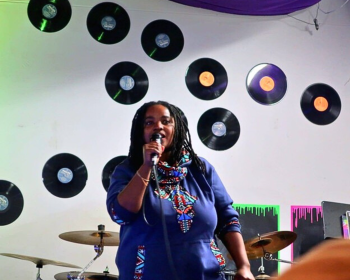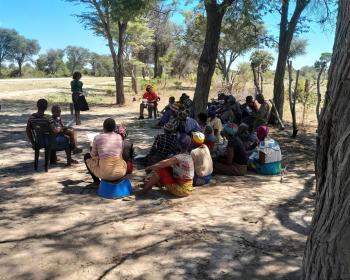The department of Nature Conservation has been active in the eastern half of Bushmanland since the formal proclamation of the so-called homeland in 1976. Unlike the residents of all other "ethnic homelands" in Namibia, Ju/Wasi have no representative council and are virtually wards of the state. Bushmanland is described vaguely as being "kept in trust for its residents." In effect, however, it is up for grabs; several conflicting interest groups, both within and outside of the government, have their eyes on it. The most dominant of these, drawing on a powerful international lobby, is Nature Conservation.
Plans to declare eastern Bushmanland a game reserve gathered momentum but coincided with the beginning of the "outstation" movement in the early 1980s. (1) A game reserve would have prevented development of the newly established farming communities; those groups starting out would have been relocated back into a situation of dependency and decline. An extensive local and international media campaign launched by the !King San Foundation and its supporters (and to an extent, perhaps, by those interest groups who wanted to see Bushmanland opened up for ranching to outsiders) caused the plan Conservation, Andreas Shipanga, formally stated that there would be on game reserve, and that Ju/Wasi could live and farm wherever they chose in eastern Bushmanland.
Since Shipanga's statement, however, a number of various government officials have denied Ju/Wasi the right to farm in certain areas. First, a prohibition for veterinary reasons was made against settling with cattle within 25 km of the Botswana border. No such restriction was put on areas north and south of Bushmanland, where Namibian and Botswanan cattle rubbed noses with impunity. Moreover, when asked, the Director of Veterinary Services said that there were no veterinary reasons for farming to be restricted along the border.
The next statement on restrictions, some time later, came again from Shipanga: no farming within 25 km of the border, this time for reasons he was "unable to disclose" (i.e., presumably security reasons). That statement was subsequently dropped, but recently Ju/Wasi were again told not to farm within 10 km of the border for veterinary reasons. The !King San Foundation also was told not to drill boreholes for new communities in the northeastern quadrant because it "belonged" to Nature Conservation.
In addition to making these statements, Nature Conservation has carried on as if a game reserve existed de facto, if not de jure. More than most, the Ju/Wasi want to see game conserved. But as would any other farmers, they want - and have a right to - protection from the ravages of problem animals. As Nature Conservation adds water points to attract game, predators and elephants are attracted in turn. The latter trample gardens, pull up hand pumps, bend windmills, chase cattle away from water and destroy trees. The escalating predation by lions has wreaked havoc on the Ju/Wais's small herds. In 1987, 46 cattle were killed by lions - 23 in October alone, 19 of which belonged to the /Gautcha community.
Tsamko # Toma from/Gautcha, chairman of the Ju/Wasi Farmers Union, has spent the past year waiting for a rifle permit, a procedure that should have taken a few weeks. The official attitude is: give a Bushman a gun and he will instinctively shoot everything in sight. Nature Conservation protects lions ("their dogs," as Tsamko calls them), while Ju/Wasi risk jail and their own lives when they take things into their own hands. Their poisoned arrows and short spears are all that protect them and their livestock. In any other farming area, lions would be shot immediately.
The problem is the lack of definition on the status of Bushmanland. For some time a conflict of interest has existed in the east between the Department of Nature Conservation and the Department of Agriculture (both of which fall under the same government department). Despite pressure, no declaration was ever made as to whether eastern Bushmanland was a farming area or a conservation area. Agriculture has helped some farming communities with boreholes and other infrastructures. In places where the infrastructure belongs to Nature Conservation (inherited from Consolidated Diamond Mines when they pulled out of the area in the early '80s), farming communities dependent on them are vulnerable. In several cases, Nature Conservation has removed pumps and windmills, forcing residents to drink from the muddied waters used by game and cattle or, in the dry seasons, to go without water. (2)
Regarding status, a compromise was finally reached: eastern Bushmanland is now designated as a trophy-hunting area and the franchise was given to a private safari company earlier this year. Ju/Wasi were not consulted, however, and their protests (a delegation of the Ju/Wa Farmers Union went to the government in Windhoek) were ignored. They were told that the revenues from the license fees would be channelled back into Bushmanland for development and, furthermore, that the hunters would take care of the problem animals. So far the trophy business, dominated by Americans and Germans, has been booming. The revenues, however, go straight into the central government fund and never make it to Bushmanland. The number of elephants shot is, and will be, negligible; Ju/Wasi also fear that hunting them will make them more aggressive toward humans. In addition, trophy hunters shoot only male lions, while the lionesses are the ones that do most of the hunting.
Meanwhile, Nature Conservation continues to breed up, and protect game for, the hunters, and Ju/Wasi continue to lose out. Officials said that two new water points drilled this year for game in the northeast would draw elephants away from the farming communities if people stayed in the southern half of the area. But Ju/Wasi need all the land they have left to them. In addition to the existing communities (there are now 12), eight more are planned.
There is no official recognition of Ju/Wa land rights, or of the Ju/Wa Farmers Union. At present, Ju/Wasi in eastern Bushmanland are represented by an advisory body of four men chosen by the Department of Governmental Affairs (whose jurisdiction over Bushmanland replaces that of the Administrator General, and before that, the South African Prime Minister). This body "advises" a committee composed of various government departments that claim interests in Bushmanland. Ju/Wasi have no assurance that their interests will be taken into account, much less take precedence. Bushmanland is a stage, government officials (and the military) the actors and Ju/Wasi merely spectators. The only security for their survival is for them to settle and farm their land as rapidly as possible.
The perpetual state of emergency puts great strains on the Ju/Wasi, their union and their foundation. Considering how Ju/Wasi, lived one or two generations ago and the odds they are struggling against now (deep cultural constraints, in addition to all the problems imposed from the outside), their achievements are remarkable.
Notes
1. Game in the western half of Bushmanland is negligible because the area is arid and waterless. For the same reason, it was never part of Ju/Wa traditional territory. Today it is inhabited solely by the South African Defence Force, which has camps located around deep boreholes.
2. For this reason, future communities will settle at boreholes drilled by the Ju/Wa Farmers Union and the !King San Foundation.
Article copyright Cultural Survival, Inc.


